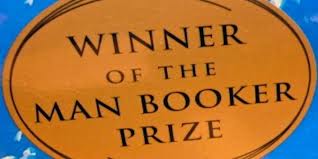What’s the best way to run a major book prize?
 The United States is such a big player on the world stage that sometimes other countries are grateful for a space where Americans cannot intrude. This may be especially true on the cultural stage.
The United States is such a big player on the world stage that sometimes other countries are grateful for a space where Americans cannot intrude. This may be especially true on the cultural stage.
So it was huge news in the book world when the Man Booker Prize changed its policy of only permitting works in English by authors from the British Commonwealth (plus a few historical add-ons). Prize administrators have decided it should be open to English-language entries without any barrier for nationality of the author.
Oh, there are other salient details about eligibility. But keep in mind that just being listed for the award carries considerable prestige. And then there’s the fat top prize of £50,000. So this is a big change.
Here’s more about the decision, from the Man Booker website:
Initially the thinking was that we might set up a new prize specifically for US writers. But at the end of the process we were wary of jeopardising or diluting the existing Man Booker Prize. Instead we agreed that the prize, which for 45 years has been the touchstone for literary fiction written in English of the highest quality, could enhance its prestige and reputation through expansion, rather than by setting up a separate prize.The prize is now regarded widely as the most important and influential award for literary fiction in the English speaking world. But paradoxically it has not been allowed full participation to all those writing literary fiction in English. It is rather as if the Chinese were excluded from the Olympic Games- I appreciate this analogy is not entirely appropriate. I think Sam Leith in the Evening Standard a couple of days ago captured the essence of what we are doing; he wrote ‘The territory of the English novel is the English language’. Fintan O’Toole writing in The Observer last Sunday about the shortlist headed his article ‘This glorious and anarchic English language that lets everyone in’. We are embracing the freedom of English in its versatility, in its vigour, in its vitality and in its glory wherever it may be. We are abandoning the constraints of geography and national boundaries
What do you think?
More unfettered globalization? The dampening of not-famous voices from smaller nations?
Or a wonderful new era of inclusion?
Bonus question: are you any more likely to read a book based on any prizes it may have won?
Tags: books, culture, globalization, language, literature, Man Booker Prize






.jpg)

I don ‘t know. Must we play the “BEST” game in everything?
Why not just get rid of all the prizes?
Man Booker, Booker T & the MG’s, whatever.
I’m not more like to read a book because it won an award. But I’m certainly more like to hear a report or read a review or article about it because it won an award.
I think it is a good move, and long overdue. Can you imagine if novelists from India (Rushdie) or South Africa (Gordimer) or Canada (Ondaatje) had been excluded from the competition? A little perspective can be very useful. Let’s see how American novels work outside of These United States.
Of course, not all Man-Booker winners are truly winners, but I will pick up a shortlisted book if it sounds interesting. Really loved Wolf Hall and Bring Up the Bodies by Hilary Mantel, and I wouldn’t have bothered without knowing that they won a prize.
Here’s another NYT article on reaction to the move: The Backlash to the American Invasion of the Booker Prize
BTW, that article describes the top prize’s value thusly: “The Man Booker award comes with a prize of £60,000, or about $96,000.” (I mistakenly used a lower number, from earlier in the prize’s existence.)
With so much publicity and money on the line, t’s easy to see why passions run so high.
It wouldnt hurt to have more prizes. It would give more authors more exposure. Or a bigger “long list”.
There are some great African writers who write in English. Some have gotten US academic appointments.